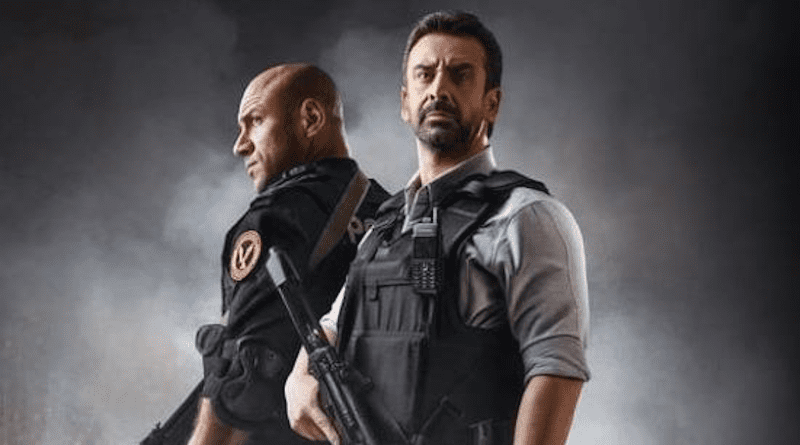Egyptian TV Series A Reminder Of Corrupt, Power-Hungry Muslim Brotherhood – OpEd
By Arab News
By Ibrahim Shukralla
Muslim Brotherhood Supreme Guide Mohammed Badie, who was seen by many as the de facto ruler of Egypt during Mohammed Morsi’s presidency, tells the then-Minister of Defense Abdel Fattah El-Sisi: “Isn’t it enough that we still could not penetrate the army?” It is an astonishing statement that bluntly unleashes his intention of controlling the state’s most respected and influential establishment.
This scene from Egyptian series “The Choice 3,” which could be the closest thing the Arab world has to Netflix’s “House of Cards,” aired during Ramadan. It evokes an era in Egypt’s history, which, if it had continued, would have ensured an already-disastrous Middle East would today be an even darker place.
“The Choice 3” features the leadership style of Morsi and his political party, the Muslim Brotherhood, during their rule between 2012 and 2013, presenting corrupt, power-hungry, irrational and impulsive dispositions. Two months from now, on June 30, Egypt will mark the ninth anniversary of the protests that led to Morsi’s removal.
Our region and the world at large do not seem to want to welcome another theocratic, medieval church-like regime such as the Muslim Brotherhood, which for a time ruled the third-largest Arab economy, its biggest population and largest active military manpower.
If this regime were still in charge, it would have stimulated a terrorist, exclusion-centric doctrine at a time when the region has never been more desperate for stability, prosperity and peace in a deeply polarized world.
The Islamist party, which took advantage of the 2011 Arab Spring protests to come to power after Hosni Mubarak stepped down, could not address the crises that involved crucial shortages, such as water, electricity, gas and fuel, which largely effected ordinary people.
Instead, the series shows leaders of the party, most notably Deputy Supreme Guide Khairat El-Shater, occupied with conspiring against then-Commander-in-Chief of the Egyptian Armed Forces and Minister of Defense Mohammed Hussein Tantawi and state prosecutor Abdul Majid Mahmoud, aiming to replace them with Muslim Brotherhood-leaning officials.
Scoring political gains and influence and remaining in power were the ultimate goals.
The party only believed in loyalty to its ideologies and, therefore, it wanted to sideline those who were not loyal enough across the state’s main divisions and entities. Unlike the notion it had tried to sell, competence was not a main requirement: Abiding to the Muslim Brotherhood’s doctrines and rules, as well as complete allegiance to its leaders, were more important.
A Christian couple in the series was shown being marginalized by the community as the ill-fated circumstances created by the ruling party for non-Muslims — and non-Brotherhood supporters in particular — forced them to file a request for immigration. The husband did not want to leave his country, but then he became convinced by his wife’s view that, if they were to one day have children, Egypt would not be the right country to raise them in.
In April 2013, when Morsi was still the president, four Christians were killed in sectarian clashes. Subsequently, thousands of mourners were attacked and besieged by police and armed civilians at the country’s largest cathedral as they tried to leave.
The head of Egypt’s Coptic Church, Pope Tawadros II, criticized Morsi’s “negligence” and lack of action to prevent such acts. Many analysts were surprised by the pope’s tone. However, the ideologies that the ruling party brought to the country evidently embedded hate speech, xenophobia and the elimination of opponents. Contrary to what they had been promoting to the West, this was a poor man’s version of democracy — a mixture of theocracy and extreme autocracy. The separation of powers was not on the agenda for the Muslim Brotherhood, and that was made clear when Morsi issued a constitutional declaration that gave him sweeping powers over the judicial system, sparking anger among Egyptians.
To date, Saudi Arabia, Russia, Bahrain, the UAE, Egypt, Kazakhstan, Syria, Tajikistan and the Collective Security Treaty Organization have designated the Muslim Brotherhood as a terrorist organization. Former US President Donald Trump had the intention to designate it as a foreign terrorist organization in 2019.
“The Choice 3” is a political drama, but it mirrors the dynamics of politics and socioeconomics in Egypt during the approximately year-long rule of the Muslim Brotherhood under Morsi. The latter appeared in the series as weak, indecisive and lacking the top-notch leadership skills and expertise to lead a country like Egypt. Badie and his deputy Al-Shater (both currently imprisoned) appeared as the main drivers behind the major decisions taken by Morsi.
This region needs more forward-thinking, modern, tolerant, reformist leaders in order to rise and provide a quality standard of living for its citizens. It needs less politics and more hope for the youth by taking constructive steps toward building better nations. That was not on the cards under Morsi and his political cult.
- Ibrahim Shukralla is a Dubai-based Emirati journalist. He has interviewed many heads of state and high-profile political and sporting figures. He holds an MA in media, culture and communications from New York University in the US. Twitter: @shukralla


“The Islamist party, which took advantage of the 2011 Arab Spring protests to come to power after Hosni Mubarak stepped down.” They “took advantage” by actually being elected by the voters. It is the overthrow of a democratically elected and reformist government that should be raising concerns.